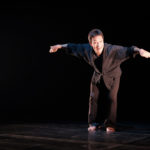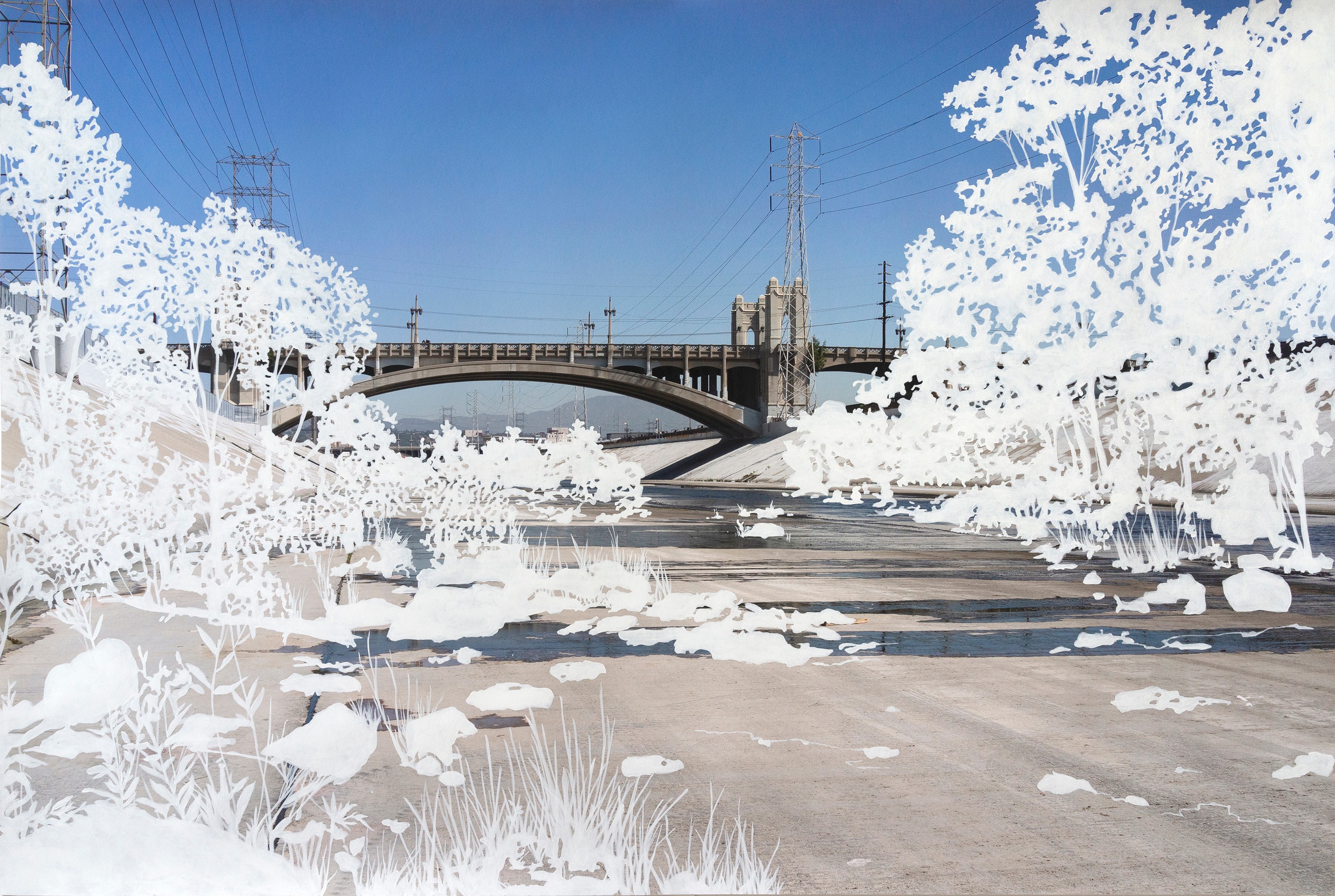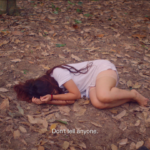YUMA o la tierra de los amigos (YUMA, or the Land of Friends)
2014 - Photography (Photography)
Carolina Caycedo
YUMA o la tierra de los amigos (YUMA, or the Land of Friends) by Carolina Caycedo is a large mural containing a series of satellite photographs mounted on acrylic. The mural contrasts and mixes multiple layers of these satellite images capturing the progressive devastation of the El Quimbo dam on the Yuma river (Magdalena), in the Department of Huila. The project was originally produced for the 8th Berlin Biennale, and developed out of the artist’s research into waterways, their political and cultural impact, and their historical development. In this work Caycedo focuses on the particular case of the El Quimbo Dam in Colombia, a dam along the Magdalena River. It was the first hydroelectric power project in Colombia to be constructed by a transnational, private corporation, signifying the transition of this geographically, ecologically, and historically important public body of water into a privatized resource. The dam’s construction required the redirection of the Magdalena River, the main fluvial artery in the country, which affected a vast area and displaced the Indigenous population of the region. Through this case, Caycedo investigates the destructive cultural and environmental consequences of erecting dams, as well as the desire to master the course of nature and the complicity of state power in quelling social unrest.
Carolina Caycedo’s work triumphs environmental justice through demonstrations of resistance and solidarity. The artist uses drawing, photography, film, and performance at venues and vehicles for research and action. Caycedo’s work addresses and laments the corruption of power and the destruction of nature by corporate greed, justified by progress. With regard to pressing concerns of global climate change, causing destruction to communities via droughts and natural disasters, Carolina’s works address the implications and consequences of such carelessness towards the future of the earth and its inhabitants. The artist’s use of technology to mediate these concepts provides a harmonious relationship between content and form. Caycedo’s work offers utopian models to inhabit in a world in which individuals and communities are increasingly subject to commodification, exploitation, and discrimination.
Colors:
Other related works, blended automatically
» see more

© » KADIST
Carolina Caycedo
2015Carolina Caycedo’s practice conveys her very personal passion and relationship to water, as a powerful necessity and spiritual reminder...
Related works sharing similar palette
» see more

© » KADIST
Subas Tamang
2021Masiniya Matawali by Subas Tamang is an etching and aquatint print based on photographs taken by German photographer Volkmar Wentzel in 1949...

© » ARTS EQUATOR
Weekly Southeast Asia Radar: Digital pantomime, Myanmar artist charged with blasphemy | ArtsEquator Thinking and Talking about Arts and Culture in Southeast Asia ArtsEquator Radar Padepokan Seni Bagong Kussudiardja April 9, 2020 ArtsEquator’s Southeast Asia Radar features articles and posts about arts and culture in Southeast Asia, drawn from local and regional websites and publications – aggregated content from outside sources, so we are exposed to a multitude of voices in the region...
Other works by: » Carolina Caycedo
» see more

© » KADIST
Carolina Caycedo
2015Carolina Caycedo’s practice conveys her very personal passion and relationship to water, as a powerful necessity and spiritual reminder...

© » KADIST
Carolina Caycedo
2013In this two-channel video installation, Spaniards Named Her Magdalena, But Natives Called Her Yuma , Carolina Caycedo gathered footage during numerous research trips to dam sites in the Harz Mountains, Saxony, Westphalia and the Black Forest in Germany interspersed with images of the Rio Magdalena region in Colombia...
Related artist(s) to: Carolina Caycedo » Julieta Aranda, » Carla Zaccagnini, » Alejandro Cesarco, » Alexander Apóstol, » Carlos Motta, » Gilda Mantilla, » Juan Araujo, » María Inés Rodríguez, » Mateo López, » Nicolás Robbio
» see more

© » KADIST
Julieta Aranda
2016The video Swimming in rivers of Glue is composed of various images of nature, exploring the themes of exploration of space and its colonization...

© » KADIST
Carla Zaccagnini
2005This series of photographs, Sobre la igualdad y las diferencias: casas gemelas (On Equality and Differences: Twin Houses) , taken in Havana in 2005, belongs to a wider group of works that the artist has been developing over many years, generally titled Bifurcaciones y encrucijadas (Forking Paths and Crossroads) ...

© » KADIST
Mateo Lopez
2012With Roca Carbon ( Charcoal Rock , 2012) and Roca Grafito ( Graphite Rock , 2012), López plays with our relationship to inert and unremarkable objects such as rocks...
Related works found in the same semantic group
» see more

© » KADIST
Som Supaparinya
2012The flat, wide river holds on its surface a tour-boat of memories, as Som Supaparinya documents her Grandfather’s return via cruise to familiar territories in rural Thailand that were submerged after the Thai government installed a series of dams...

© » KADIST
Köken Ergun and Satyam Mishra
2022Nepal and China signed an agreement for the Belt and Road Initiative (BRI) in 2017...

© » ART AND CAKE
In the Trenches: Artists Encounter the Los Angeles River, Part 1 – Art and Cake August 30, 2023 August 30, 2023 Author In the Trenches: Artists Encounter the Los Angeles River, Part 1 Michelle Robinson 2023 What Was 4th Street Acylic paint on print 40×60 in By Lawrence Gipe In the mid-1980’s, I lived on Santa Fe Avenue and 7th Street, and the idea of Los Angeles having a “river” was a bit of a joke...




